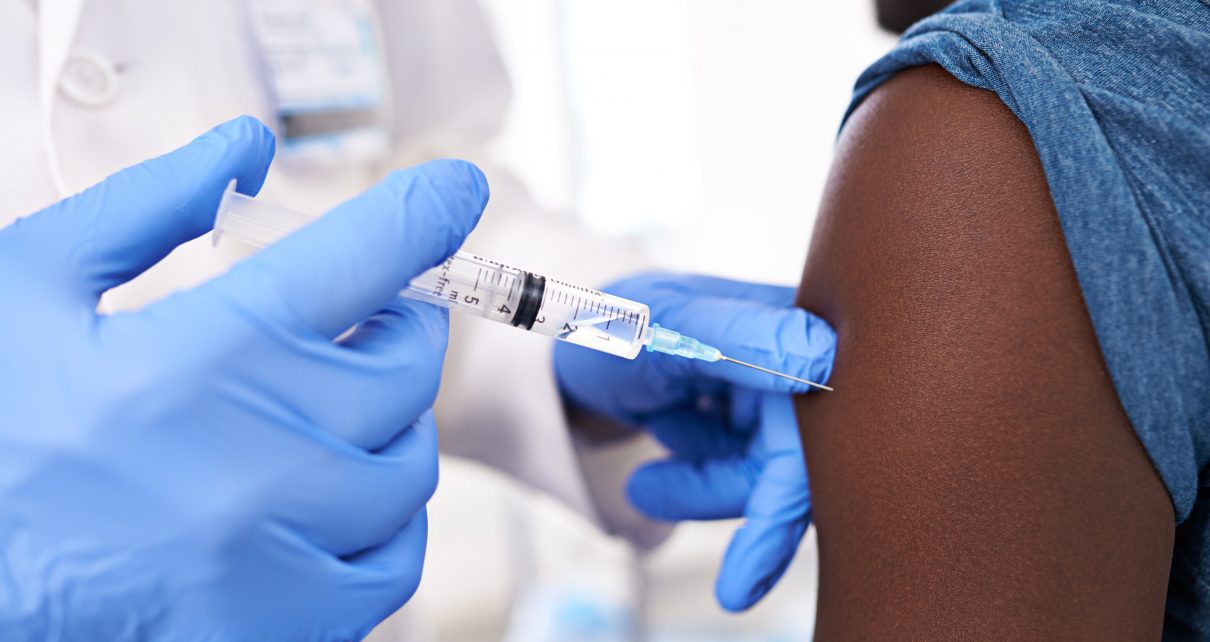U.S. health officials are urging Americans to get their flu shots this year in the hopes of thwarting a winter “twindemic”—a situation in which both influenza and COVID-19 spread and sicken the public. But a new study suggests that there could be another key reason to get a flu jab this year: it might reduce your risk of COVID-19. The research, released as a preprint that has not yet been peer-reviewed, indicates that a flu vaccine against the influenza virus may also trigger the body to produce broad infection-fighting molecules that combat the pandemic-causing coronavirus.
The paper is in line with some other recent studies published in peer-reviewed journals that point to similar effects. But researchers caution the research is preliminary and needs to be bolstered by more rigorous experiments.
In the new study, Mihai Netea, an infectious disease immunologist at Radboud University Medical Center in the Netherlands, and his colleagues combed through their hospital’s databases to see if employees who got a flu shot during the 2019–2020 season were more or less likely to get infected by SARS-CoV-2, the virus behind COVID-19. Workers who received a flu vaccine, the researchers found, were 39 percent less likely to test positive for the coronavirus as of June 1, 2020. While 2.23 percent of nonvaccinated employees tested positive, only 1.33 percent of vaccinated ones did. Netea and his team posted their findings on the preprint server MedRxiv on October 16.
These findings do not prove that flu vaccines prevent COVID-19, however. “This is an intriguing study, but it doesn’t provide definitive evidence,” says Ellen Foxman, an immunobiologist and clinical pathologist at the Yale School of Medicine. There could be other explanations for the association the Radboud scientists and their colleagues found. For instance, people who choose to receive a flu shot may be more health-conscious and more likely to follow COVID-19 prevention guidelines than individuals who do not get vaccinated. Netea agrees, noting that overall behavior, rather than the shot, might have made people in the former group less likely to get sick in his study.
Studies such as these, which find correlations between behaviors and outcomes, cannot establish cause and effect. Determining whether flu shots actually prevent COVID-19 “requires big clinical trials at the level of the [general] population,” says Maziar Divangahi, a pulmonary immunologist at the Research Institute of the McGill University Health Center. Netea acknowledges this but points out that such a clinical trial would require a randomly chosen control group of subjects to be denied flu shots. “That’s not ethical,” he says.
Netea and his team also conducted a laboratory experiment that suggested how flu shots could prevent coronavirus infections. First, they purified blood cells taken from healthy individuals. Then they exposed some of the cells to the Vaxigrip Tetra flu vaccine, made by Sanofi Pasteur, and let the cells grow for six days. After that, the researchers exposed the cells to SARS-CoV-2 and analyzed them one day later.
The cells that had first been primed with the flu vaccine produced more of several kinds of virus-fighting immune molecules, known as cytokines, than did those that had not been exposed to the vaccine. Though such molecules can be detrimental when they are produced late in a patient’s course of COVID-19—inciting a so-called cytokine storm, which can damage many body organs—cytokines produced early in the infection process are helpful, Divangahi explains. They “get rid of the pathogen,” he says, making the infection milder.
It might seem far-fetched that a vaccine designed to protect against one infection could protect against others, too. But a growing body of research suggests that this does, in fact, occur through a process called “trained innate immunity.” Vaccines are known to work by stimulating the adaptive immune system, causing the body to make antibodies that can recognize and attack a specific pathogen if it is encountered again. But recent studies suggest that some vaccines also train the body’s faster-acting and less specific innate immune system, improving its ability to fight off many kinds of infections. Vaccines appear to achieve this feat by reprogramming stem cells that give rise to cells involved in this early innate immune response.
“There is evidence from the literature that trained immunity does exist and can offer broad protection, in unexpected ways, against other pathogens besides what the vaccine was designed against,” Foxman says.
Although results have overall been mixed, other recent studies have linked flu vaccines—as well as other vaccines—with lower COVID-19 risk. In two papers, one published in the journal Vaccines in September and the other in the Journal of Medical Virology in June, researchers found that COVID-19 rates were lower in regions of Italy where higher percentages of adults aged 65 and older had received a flu vaccine. And in a preprint paper released in July, researchers at the Mayo Clinic and the biomedical computing company nference found that adults who had received vaccines for flu, polio, chicken pox, measles-mumps- rubella (MMR), Haemophilus influenzae type B (Hib), hepatitis A or B, or pneumococcal disease over the past five years were less likely to test positive for the novel coronavirus than people who had not received any of them.
Now nearly two dozen clinical trials around the world are underway to determine whether the bacillus Calmette-Guérin (BCG) vaccine against tuberculosis could protect against COVID-19. (Netea is helping to run one of them.) BCG has been linked to a reduced risk of infections and of overall child mortality even when tuberculosis is not spreading in a particular region. In Netea’s new study, he and his team exposed a subset of immune cells to the BCG vaccine before the flu vaccine. They found that exposure to both vaccines increased cytokine production even more than the flu vaccine alone. Netea says that he plans to design additional studies to tease out the flu vaccine’s effects on COVID-19 risk, including among older adults.
For now, though, there are still more questions than answers. “As far as telling people, ‘You should go get a flu vaccine because it can protect you from COVID,’ that’s a little bit of a stretch at this point,” Foxman says. But, she adds, people should still go get the flu shot—because, at the very least, “it’s going to protect you from the flu.”
Read more about the coronavirus outbreak from Scientific American here. And read coverage from our international network of magazines here.



